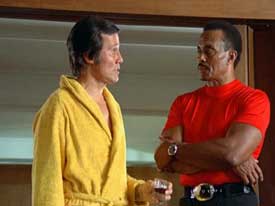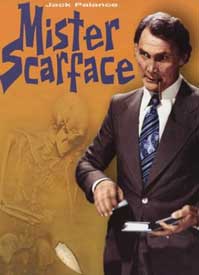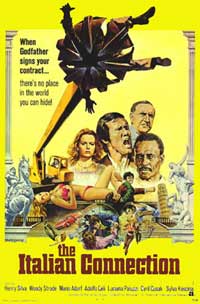La Mala ordina (1972) is perhaps best known in English language release on dvd as Manhunt, but was originally circulated as The Italian Connection, plus the miscellaneous titles Hit Men, Manhunt in the City & for the blaxploitation market Black Kingpin.
 An American organized crime lord sends two of his men (Henry Silva & Woody Strode) to Milan to kill Luca Canali (brilliantly played by Mario Adorf) who supposedly doublecrossed the American mob. Only problem is, nobody told small-time pimp Luca anything about it. When the local mafia & the two American mobsters begin tracking him down with intent to kill, he hasn't a clue what it's all about. An American organized crime lord sends two of his men (Henry Silva & Woody Strode) to Milan to kill Luca Canali (brilliantly played by Mario Adorf) who supposedly doublecrossed the American mob. Only problem is, nobody told small-time pimp Luca anything about it. When the local mafia & the two American mobsters begin tracking him down with intent to kill, he hasn't a clue what it's all about.
At first it seems like Luca is nothing but a tough trashy-flashy tub of lard pimp whose only decent trait is he loves his little daughter. But the more we get to know him, the more fascinating he is, a schlub of an underclass hero who startles the bigtime mobsters by turning out to be a whole lot harder to kill than they'd expected.
The black hitman from America (Strode) never smiles, never seems to enjoy himself, just has a job to do. Silva's character is jollier & a horndog, but no less fierce in a battle.
The tale drums up a lot of sympathy for the pimp, who doesn't want to kill anyone but keeps killing them anyway because they're trying so hard to kill him. Along the way he unravels the mystery of how a nobody like him was put in the position of fall guy. He's scared shitless, but when young hoodlums posture all macho & murderous in his presence, he manages always to be the last guy standing.
For those of us who are also fans of "chivalrous gambler" ninkyo films from Japan, there's a certain yakuza quality to how this underdog finally has no choice but to make a one-man raid on the headquarters of Don Vito (Adolfo Celi), taking on all Don Vito's lieutenants & the big boss himself. "I'm a bug as you say," Luca readily admits, but by now he's the only cool one.
By the climactic shoot-out with the Americans, it's clear there's no good reason for any of this, but also no way to quit, & by now Luca even has family to avenge. Everyone is a pawn in a folly-ridden international conspiracy. A little oil-stained white kitten in the automobile graveyard becomes a central symbol in the midst of the last reel of exposive action.
Sure, Manhunt/The Italian Connection is a cheap little action picture, but it's a good gangster story & it's got heart. I hugely liked it.
 Fernando Di Leo, who wrote & directed The Italian Connection made many similar gangster films in the 1970s. For all their limited budgets & weakening dubbing, his are emotive films that have a great deal more to them than the thrilling violence. At first glimpse they're just old action-circuit cheapies, but fans of B gangster films will know at once there's something larger to Di Leo's films. Fernando Di Leo, who wrote & directed The Italian Connection made many similar gangster films in the 1970s. For all their limited budgets & weakening dubbing, his are emotive films that have a great deal more to them than the thrilling violence. At first glimpse they're just old action-circuit cheapies, but fans of B gangster films will know at once there's something larger to Di Leo's films.
I Patroni della citta (1976) is probably best known in English as Mister Scarface, but has also been circulated as Blood & Bullets, Scarface Killer, The Big Boss & Rulers of the City. It's not quite as good a film as Manhunt, but it delivers everything a little actioner should, plus an underlying dose of Romanticism that touches the heroic spirit.
Scarface Manzari is a scary mob boss played with restrained demonism by Jack Palance. It takes a while to notice he does indeed have a small scar high on his cheek, hardly sufficient to explain his nickname, & it might've been smarter to give him no scar at all so that his naturally crinkly features are scars enough. Except that there's a revenge-motif for one character connected to the day Manzari got that scar, so perhaps the make-up artist should've made it more noticeable.
One of Scarface Manzari's men is caught cheating in a rival boss's club. He's beaten & tossed out, & when Manzari finds out, he has his man beaten again for getting caught, & kicked out of the gang. But the insult to a gang member will not be allowed to stand, so Manzari with a couple big lieutenants drops in at the rival club pretending he wants to gamble, & asking a skittish Napoli (Vittorio Caprioli) for a big loan against an IOU Scarface will never honor, thus feeling avenged for the mistreatment of one of his gang members.
Luigi Cherico (Edmund Purdom), the rival boss, is out three-million lire & would like to get it back, but everyone fears Scarface, so he's inclined to forget it. A devil-may-care up-&-coming young gangster, Tony (Harry Baer), gets permission to collect on the debt, assisted by his new buddy Rick (Al Cliver), the gangster Scarface kicked out of his gang, & who has his own mission of vendetta.
They pull off a sting by posing as easily corruptible government officials, tricking ten million lira out of Scarface. Three million they turn over to his boss, & pocket the rest.
The resulting war is not good for either gang, but somehow our Italian Butch & Sundance remain unconcerned how much damage is done, just so long as they can survive it, & keep their comical mentoring old pal Napoli safe while they're at it.
Luigi's fate at the hands of his own lieutenant Beppi (Enzo Pulcrano) scarcely affects our trio; they're out for themselves. They're not heartless thugs, though, & they do manage to avenge Luigi. Their biggest saving grace, however, is the real friendship between Tony, Rick & Napoli. In a world where nobody trusts anyone, they really can trust each other.
There's a spaghetti-western conclusion for Scarface's character & nice big heist of dirty money for our heroic hoodlums. The lengthy shoot-out that follows the demise of Scarface does get redundant & it's a bit odd that the worst of the bad guys doesn't last for the finale. The violence must have seemed over the top in 1976 as it's still pretty strong even by today's standard. It's kind of a no-budget version of Mean Streets (1973) with its young violent heroes, with the violence amped upward under the influence of The Godfather (1972).
copyright © by Paghat the Ratgirl
|

 An American organized crime lord sends two of his men (Henry Silva & Woody Strode) to Milan to kill Luca Canali (brilliantly played by Mario Adorf) who supposedly doublecrossed the American mob. Only problem is, nobody told small-time pimp Luca anything about it. When the local mafia & the two American mobsters begin tracking him down with intent to kill, he hasn't a clue what it's all about.
An American organized crime lord sends two of his men (Henry Silva & Woody Strode) to Milan to kill Luca Canali (brilliantly played by Mario Adorf) who supposedly doublecrossed the American mob. Only problem is, nobody told small-time pimp Luca anything about it. When the local mafia & the two American mobsters begin tracking him down with intent to kill, he hasn't a clue what it's all about.